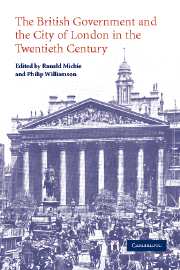Book contents
- Frontmatter
- Contents
- Notes on contributors
- Acknowledgements
- Conventions and abbreviations
- Introduction
- Part I The long perspective
- Part II Markets and society
- 3 Markets and governments
- 4 Financial elites revisited
- 5 The City and democratic capitalism 1950–1970
- Part III Government and political parties
- Part IV The interwar period
- Part V 1945–2000
- Select bibliography
- Index
5 - The City and democratic capitalism 1950–1970
Published online by Cambridge University Press: 04 July 2009
- Frontmatter
- Contents
- Notes on contributors
- Acknowledgements
- Conventions and abbreviations
- Introduction
- Part I The long perspective
- Part II Markets and society
- 3 Markets and governments
- 4 Financial elites revisited
- 5 The City and democratic capitalism 1950–1970
- Part III Government and political parties
- Part IV The interwar period
- Part V 1945–2000
- Select bibliography
- Index
Summary
The City and democracy make an unlikely combination, but in this essay they are at the heart of efforts to make post-1945 capitalism more popular and better understood. That is what is meant by ‘democratic capitalism’: an economic system which distributes its benefits widely, and whose logic is understood by the people. The mechanism for achieving a popular capitalism was to be ‘wider share ownership’. Both the Conservative and Labour parties at various times supported the idea of encouraging more people to buy shares. Although there was some success in the Thatcher period, the idea failed to take root. Most people participate indirectly in the stock market through pension funds and insurance companies. Given the volatility of the stock market, and the fact that few low- to middle-income people have the resources to live with these fluctuations, such an arm's length connection would seem the most practicable relationship with the City. However, even if this essay deals with a project that failed, it explores some key themes: the value of the City for government and its role in the wider society; the working-class economy and its priorities; the nature of capitalism and sources of support for it. The broad conclusion is twofold. First, the wider share ownership campaigns had identified a real issue about popular support for capitalism; but second, the features of capitalism that the stock market revealed, namely dynamic and volatile growth, were precisely those to which workers were already exposed and from which they sought relief.
- Type
- Chapter
- Information
- Publisher: Cambridge University PressPrint publication year: 2004



